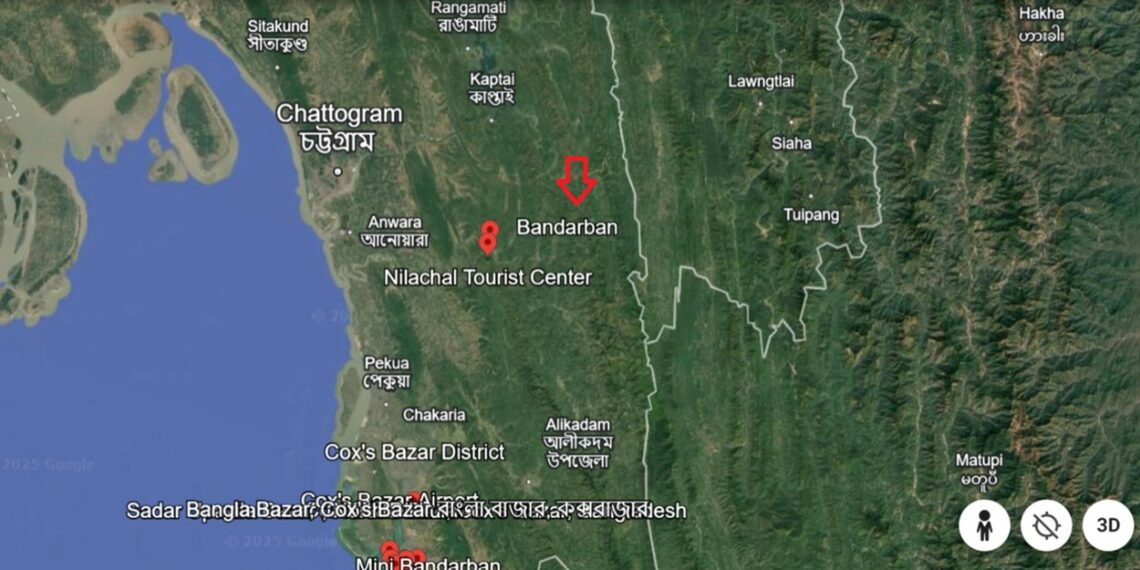A vast swathe of territory between Cox’s Bazar and Bandarban will be declared a “military operations zone” (MOZ) that will not only facilitate the Bangladesh Army’s plans to support the Arkan Army but will also “effectively address” ongoing border security challenges, Northeast News has reliably learnt.
As a consequence of the operationalisation of this decision, the Border Guard Bangladesh (BGB) will step back from the border and pave the way for its dominance and control by the Army. Bangladesh officials, however, were tightlipped on the precise time when the MOZ will become operational.
What is even more surprising is that Army chief General Waker-uz-Zaman along with his spouse will leave for Hajj to Saudi Arabia on June 2, sparking speculations on his absence at a time when sensitive national security-related decisions are expected to be taken in the days to come.
It is learnt that the two other service chiefs, Air Chief Marshall Hasan Mahmood Khan and Navy chief Admiral Mohammad Nazmul Hassan, will also head for Saudi Arabia (on June 2) to perform the pilgrimage in Mecca.
At least six other senior Army officers in the rank of Lieutenant Generals and Major Generals will follow Gen Zaman for the pilgrimage to Islam’s holiest city.
The number of days that all nine senior officers will remain away from Bangladesh – unusual by all accounts – will be between seven to 10 days, sources said.
Another key decision that was taken in the last couple of days was that while there will be no further reference to the controversial “humanitarian corridor”, the Army will not cross the Bangladesh-Myanmar border.
Instead, all supplies – logistics and provisions – will be provided on specific border points from where the Arakan Army will take them into their possession on their side of the boundary.
The decision on the Cox’s Bazar-Bandarban MOZ appears to be an outcome of the same stand backed by the Armed Forces Division, which is under the Chief Adviser’s Office, and the DGFI.
This indicates that the differences between two sections within the Army, on the previously proposed “humanitarian corridor”, have now been settled.
In a policy paper circulated among a select group of senior officers a few days ago, a section of senior Army officers had opined that the “only way to effectively address the ongoing border security challenges, maintain a stable humanitarian corridor and reduce the burden on the BGB is declaring the Bangladesh-Myanmar border a Military Operations Zone (MOZ)”.
This would allow the Bangladesh Arny to “take full control of the border and secure it effectively, enabling the proper distribution of resources and freeing up the BGB for other important security tasks, including the managing the border with India”.
A section of the Army that backs the MOZ decision, which is a stronger response than the one backed earlier by Gen Zaman, views the Rohingya refugee crisis as “more dire than ever”.
These senior officers view the Rohingya burden as having “increasingly overwhelmed” the BGB and that it has “diverted manpower away from core security tasks, including preventing illegal border crossings and monitoring for potential threats”.
ALSO READ: Former school teacher returns to Assam days after alleged deportation
Describing the Arakan Army as a “destabilising force along the Myanmar side of the border”, the pro-MOZ section among the Bangladeshi officer corps holds the insurgent outfit’s actions as having “direct implications for Bangladesh’s security”.
This section of Army officers concludes that creating an MOZ would “allow for enhanced surveillance, more robust border defences and the creation of a safe, stable environment for humanitarian operations”.















